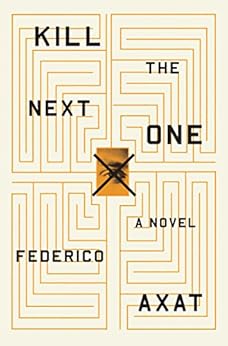 This
psychological thriller, the first book of this Argentinian writer to be
translated into English, begins with an attention-grabbing opening: “Ted McKay
was about to put a bullet through his brain when the doorbell rang. Insistently” (3). The rest of the book is a roller-coaster
ride.
This
psychological thriller, the first book of this Argentinian writer to be
translated into English, begins with an attention-grabbing opening: “Ted McKay
was about to put a bullet through his brain when the doorbell rang. Insistently” (3). The rest of the book is a roller-coaster
ride.
Justin
Lynch, the man at the door, convinces Ted to kill a man who escaped punishment
for murder and Wendell, a man who also wants to die. In return, Ted will then be killed. Having an inoperable brain tumor and believing
it would be easier for his family to cope with his murder than his suicide, Ted
agrees. Then things become really weird: the intended victims are not exactly as
Justin described and Ted starts having bizarre dreams and feels he is being
watched. He goes to see Dr. Laura Hill,
his therapist. Through his conversations
with her, we are given some insight into his family life and his past. To avoid spoilers, I can say no more except
that nothing is as it seems.
There are
many puzzling questions for which the reader craves answers: Is Ted a good guy or a deranged killer? Is his brain tumor causing hallucinations? How did Justin come to know about Ted’s plans
to commit suicide? Is Laura a
trustworthy, caring professional or an ambitious manipulator?
At times
the plot is very confusing. It is like
Ted’s mind which is full of elusive memories, “just bits and pieces, all
jumbled together.” As Ted tries to put
together those pieces into a sensible whole, the reader must try to do the same
to the plot. Readers who do not like
plots which are difficult to understand should probably stay away from this
book. I must admit that after the first
100 pages, I was ready to give up, but then I got to Part III and I became
fully engaged.
There are
numerous twists and turns in this very fast-paced narrative. Some suspension of disbelief is required, but
I found the book so interesting that it was easy to suspend disbelief. I just got sucked into the multiple layers
and possible alternate realities. The
epilogue left me puzzled in a way that inspires me to re-read this book at a
later date.
The game of
chess is significant for Ted and is mentioned several times. I had heard of the paranoia of Bobby Fischer
and the strange behaviour of other grand masters of the game, so I was
interested in a theory suggested by Laura:
“’Chess is a little paranoia-provoking in itself. You constantly have to be anticipating
threats that might never materialize, and the possible variations are virtually
infinite. Brilliant chess minds analyze
those variations, the possible moves, one after another, each one leading to
limitless ramifications. Apply that same
structure off the chessboard and the result is catastrophic’” (187).
It’s
difficult to say too much about the book for fear of ruining it for other
readers. If you like a devilishly
twisted and convoluted plot, this novel is for you. If you like books with psychological layers,
this novel is for you. It is certainly a
book I enjoyed as a totally immersing escapist read.
No comments:
Post a Comment